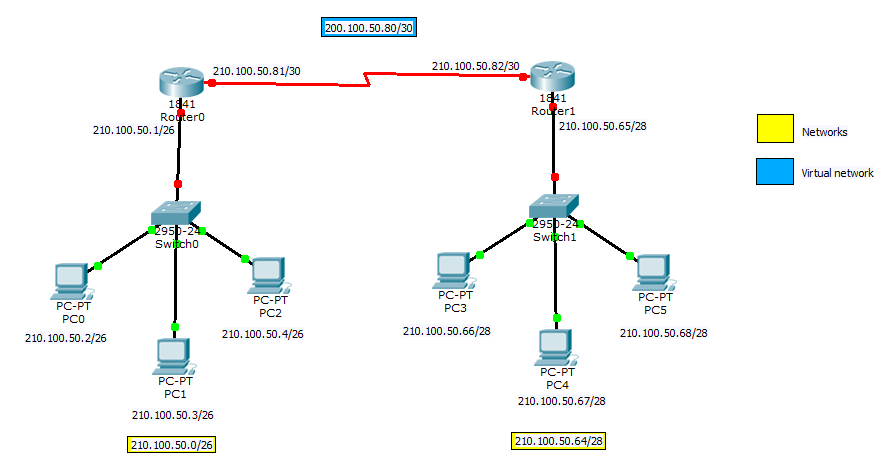
In this lab, I am gonna teach you Default Routing Configuration On Cisco Routers Step By Step Guide
Table of Contents
Default Routing Protocol – VLSM
Given network: 210.100.50.0
Required hosts on Router 1= 50
Required hosts on Router 2= 12

R1<= 50
50<= 2n – 2
50<= 26 – 2
50<= 64 – 2
50<= 62
Total number of network bits = 32
32 – n = 32 – 6 = 26 (CIDR value of Given network i.e. Router 1)
i.e. 210.100.50.0/26
N.S.M = 11111111. 11111111. 11111111.11000000
= 255.255.255.192
Block size = 256 – N.S.M
= 256 – 192 = 64
Note: Add this block size in given network so that we can get our new network for Router 2.
So the new network is 210.100.50.64/?
Now find FVH, LVH, and broadcast address
| Given Network | 210 | 100 | 50 | 0 |
| First Valid Host-FVH | 210 | 100 | 50 | 1 |
| Last Valid Host-LVH | 210 | 100 | 50 | 62 |
| Broadcast | 210 | 100 | 50 | 63 |
| New Network | 210 | 100 | 50 | 64 |
R2<= 12
12<= 2n – 2
12<= 24 – 2
12<= 16 – 2
12<= 14
Total number of network bits = 32
32 – n = 32 – 4 = 28 (CIDR value of new network i.e. Router 2)
i.e. 210.100.50.64/28
N.S.M = 11111111. 11111111. 11111111.11110000
= 255.255.255.240
Block size = 256 – N.S.M
= 256 – 240 = 16
Note: Add this block size in given network so that we can get our new network for Router 2.
So the new network is 210.100.50.80/?
Now find FVH, LVH, and broadcast address
| Given Network | 210 | 100 | 50 | 64 |
| First Valid Host-FVH | 210 | 100 | 50 | 65 |
| Last Valid Host-LVH | 210 | 100 | 50 | 78 |
| Broadcast | 210 | 100 | 50 | 79 |
| New Network | 210 | 100 | 50 | 80 |

Router 1 & 2 <= 2 hosts (we required only two IP to connect 2 routers)
2 <= 2n – 2
2 <= 22 – 2
2 <= 4 – 2
2 <= 2
Total number of network bits = 32
32 – n = 32 – 2 = 30 (CIDR of Virtual network (R1&R2)
i.e. 210.100.50.80/30
N.S.M = 11111111.11111111.11111111.11111100
= 255.255.255.252
Block Size = 256 – N.S.M
= 256 – 252 = 4
Note: Add this block size in given network so that we can get our new network for Router 3. This network can be used in future.
so the new network is 210.100.50.84/?
Now find FVH, LVH, and broadcast address
| Given Network | 210 | 100 | 50 | 80 |
| First Valid Host-FVH | 210 | 100 | 50 | 81 |
| Last Valid Host-LVH | 210 | 100 | 50 | 82 |
| Broadcast | 210 | 100 | 50 | 83 |
| New Network | 210 | 100 | 50 | 84 |

Basic Configuration on Router 1
| Router>enable Router#configure terminal Router(config)#hostname R1 R1(config)#interface fastEthernet 0/0 R1(config-if)#ip address 210.100.50.1 255.255.255.192 R1(config-if)#no shutdown R1(config-if)#exit R1(config)#interface serial 0/0/0 R1(config-if)#ip address 210.100.50.81 255.255.255.252 R1(config-if)#clock rate 64000 R1(config-if)#no shutdown R1(config-if)#exit R1(config)#exit R1#write |
Basic Configuration on Router 2
| Router>enable Router#configure terminal Router(config)#hostname R2 R2(config)#interface fastEthernet 0/0 R2(config-if)#ip address 210.100.50.65 255.255.255.240 R2(config-if)#no shutdown R2(config-if)#exit R2(config)#interface serial 0/1/0 R2(config-if)#ip address 210.100.50.82 255.255.255.252 R2(config-if)#no shutdown R2(config-if)#exit R2(config)#exit R2#write |

Default Routing Protocol – Default Configuration on Router 1
| R1>enable R1#configure terminal R1(config)#ip route 0.0.0.0 0.0.0.0 210.100.50.82 R1(config)#exit R1#write |
Default Routing Protocol – Default Configuration on Router 2
| R2>enable R2#configure terminal R2(config)#ip route 0.0.0.0 0.0.0.0 210.100.50.81 R2(config)#exit R2#write |
Verification on Router 1
| R1#show ip route 210.100.50.0/24 is variably subnetted, 2 subnets, 2 masks C 210.100.50.0/26 is directly connected, FastEthernet0/0 C 210.100.50.80/30 is directly connected, Serial0/0/0 S* 0.0.0.0/0 [1/0] via 200.100.50.82 |
Verification on Router 2
| R2#show ip route 210.100.50.0/24 is variably subnetted, 2 subnets, 2 masks C 210.100.50.64/28 is directly connected, FastEthernet0/0 C 210.100.50.80/30 is directly connected, Serial0/1/0 S* 0.0.0.0/0 [1/0] via 200.100.50.81 |




